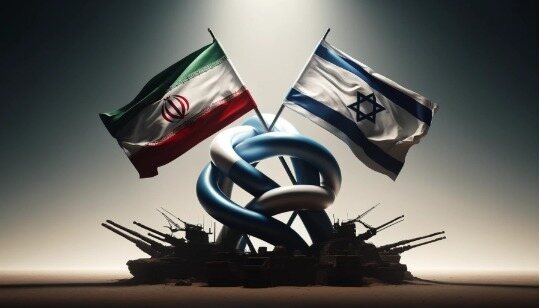Introduction
The fighting between Israel and Iran has been going on for a long time. It started back in 1979 because of big changes in Iran’s government. Since then, they’ve had lots of arguments and fights. Iran doesn’t like Israel, and they’ve even helped groups that fight against Israel, like Hamas and Hezbollah.
On the other side, Israel has a strong military, and they’re friends with the United States, which helps them out a lot. Israel sees Iran as a big threat, especially because Iran is trying to build nuclear weapons.
Recently, Iran attacked Israel using drones and missiles. This made things even more tense, and both sides argued about it at the United Nations.
What’s important now is that people try to talk and find a way to make peace. Otherwise, the fighting could get even worse and hurt a lot of innocent people.
Why Iran and Israel are enemies
The fight between Iran and Israel started a long time ago, back in 1979 when Iran’s government changed. The new leaders didn’t like Israel, and they’ve been arguing ever since. But it’s not just about religion, it’s also about who gets to be in charge in the Middle East.
Iran doesn’t like Israel, and they try to make themselves more powerful by supporting groups that fight against Israel. But Israel fights back. They have a strong army, and with help from the United States, they try to stop Iran from getting too strong in the region.
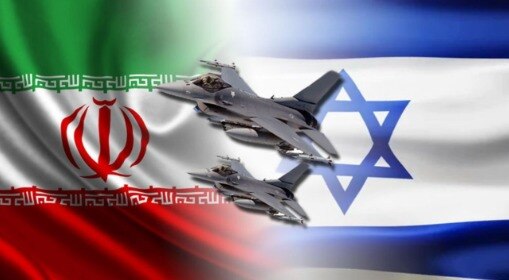
So, it’s a big, complicated argument between two countries that don’t get along, and it’s been going on for a long time.
Israel is really strong in its part of the world, especially because it has a big army and is friends with the United States. The United States helps Israel because they both don’t like Iran very much. To stop Iran from getting more powerful, the United States also teams up with other countries that don’t like Iran, like Israel and some other Muslim nations. They try to work together to keep Iran from becoming too important in the region.
Escalating Tensions Between Israel and Iran
Iran has strategically exploited the Israel-Palestine cause to position itself as a champion of Palestinian rights and to assert its dominance in the Middle East. This has been coupled with Iran’s backing of militant groups such as Hamas, Hezbollah, and the Houthis, which share Iran’s anti-Israel and anti-Western sentiments.
In response, Israel has conducted targeted strikes on weapon shipments destined for Iran-backed proxies in Syria and Sudan, aiming to disrupt their military capabilities. Moreover, Israel perceives Iran’s nuclear program as an existential threat, viewing it as a means for Iran to exert regional dominance and pressure Western allies.
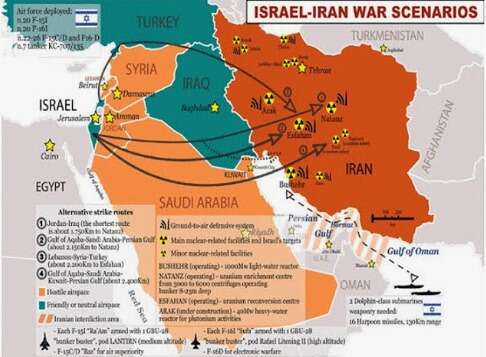
Accusations of lack of transparency surrounding Iran’s nuclear program, coupled with instances of sabotage and targeted assassinations of Iranian nuclear scientists, have further heightened tensions between the two nations.
The emergence of Azerbaijan as a key ally and oil supplier to Israel has added another layer to the conflict, potentially offering strategic advantages to Israel, including the possibility of long-range strikes on Iran.
Efforts by the United States to broker peace between Israel and Saudi Arabia were complicated by a terrorist attack by Hamas on Israel in October 2023, stalling progress on regional reconciliation.
Despite the unlikelihood of direct involvement in a conflict with Israel due to military vulnerabilities and the risk of regional escalation, tensions between Iran and Israel persist, with the resolution of their conflict remaining elusive amidst broader global conflicts.
In recent days, the escalating tensions between Israel and Iran have not only dominated headlines but also sparked heated exchanges at the highest levels of international diplomacy. A recent session at the UN Security Council underscored the gravity of the situation, with representatives from both sides presenting starkly contrasting narratives.
Israeli Concerns Raised at the UN Security Council
On the designated date, the Israeli representative took the floor at the UN Security Council, expressing grave concerns over the recent spate of attacks by Iran on Israel. The representative outlined the scale of the attacks, detailing the deployment of 170 UAVs, 120 ballistic missiles, and 30 cruise missiles, carrying a staggering 6 tons of explosive materials. Importantly, these attacks originated from Iranian soil and other neighbouring countries, marking a significant escalation in hostilities.
The representative lamented the apparent disregard of previous warnings issued by Israel regarding Iran’s aggressive posture in the region. Despite repeated calls for action, Israel’s concerns had seemingly fallen on deaf ears within the international community.
The representative emphasized Israel’s longstanding position, characterizing Iran’s ambitions as reminiscent of historical aggressors, drawing parallels to the Third Reich. Notably, Iran’s development of intercontinental ballistic missiles (ICBMs) and its support for terrorist organizations were highlighted as key facets of Iran’s purported agenda for global domination.
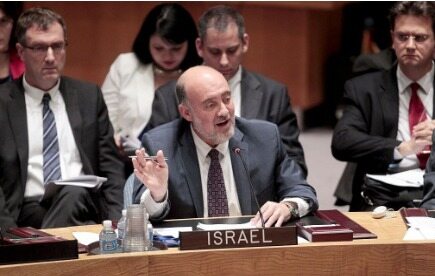
Further, the Israeli representative drew attention to Iran’s involvement in terrorist activities on a global scale, citing the 1994 terror attack in Buenos Aires as a poignant example. The representative condemned Iran’s dismal human rights record, citing the alarming number of executions within Iran in recent years.
In a resolute call to action, the Israeli representative urged the UN Security Council to condemn Iran’s actions unequivocally and demand compliance with Security Council resolutions. Specifically, the representative advocated for the designation of the Iranian Revolutionary Guard Corps as a terrorist organization and the imposition of comprehensive sanctions aimed at curbing Iran’s belligerent behaviour.
Iran’s Defense and Counter-accusations
In response to Israel’s assertions, the Iranian representative defended their actions as a legitimate exercise of their right to self-defence under international law.
The Iranian representative framed Iran’s actions as a direct response to Israeli attacks on Iranian diplomatic premises in Syria, positioning them within the framework of lawful defence mechanisms.
Notably, the Iranian representative accused the United States, the United Kingdom, and France of hypocrisy, alleging their complicity in shielding Israel from accountability for its actions.
Analyzing the Al Jazeera’s Inside Story Panel
Against the backdrop of escalating tensions, the insights provided by Al Jazeera’s Inside Story panel of experts offer additional layers of analysis, shedding light on the multifaceted nature of the ongoing conflict.
A salient event in this unfolding saga was Iran’s launch of approximately 300 drones and missiles towards Israel, marking a significant escalation. Remarkably, the Israel Defense Forces (IDF) and allied countries intercepted an overwhelming 99% of these projectiles, mitigating potential widespread damage. However, the attack did result in limited casualties, with a young girl sustaining injuries, underscoring the human toll amidst geopolitical manoeuvres.
Iran’s assertion that the attack was a retaliatory strike for an alleged Israeli assault on the Consulate in Damascus two weeks earlier adds a critical dimension to the narrative. This attack, notably originating from Iranian soil, represents a pivotal moment in the conflict, signalling a departure from previous indirect confrontations.
Israel’s War Cabinet Deliberates Response to Iran’s Attack
Israel’s War Cabinet convened on Sunday and again on Monday to weigh their options in response to Iran’s recent attack, sparking intense debate within the three-man group, according to sources familiar with the discussions.
During Monday’s nearly three-hour meeting, the cabinet reviewed military plans for a potential response, indicating a determination to retaliate against Iran. However, as of now, no decision has been publicly announced regarding the nature of this response. There is a palpable sense of urgency within the cabinet to act swiftly in the face of Iran’s aggression.
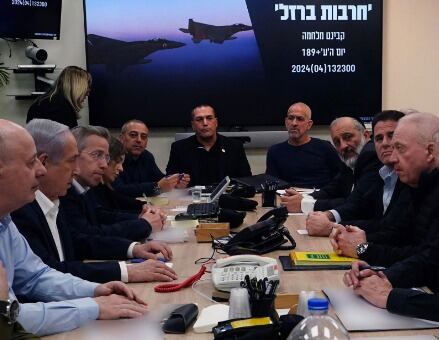
IDF Chief of Staff Lt. Gen. Herzi Halevi affirmed on Monday that Iran’s attack will be met with a response, echoing the sentiment that Israel will defend itself decisively. The IDF is prepared to take all necessary measures to safeguard Israel’s security, as emphasized by IDF spokesman Daniel Hagari. In addition to considering military options, the war cabinet is exploring diplomatic avenues to isolate Iran internationally.
Notably, Israeli government hardliners are advocating for a robust response. Finance Minister Bezalel Smotrich emphasized the need for a response that reverberates across the Middle East, while National Security Minister Itamar Ben Gvir urged Israel to take decisive action. Despite the tense situation, Israel has communicated to the United States that it seeks to avoid significant escalation with Iran, prioritizing self-defence.
Iran, meanwhile, has issued warnings of further retaliation if Israel proceeds with counterattacks. The Commander of the Islamic Revolutionary Guard Corps (IRGC), Hossein Salami, declared a new equation in Iran’s stance towards Israel, vowing to respond to any future attacks on Iranian interests, assets, or citizens. As tensions escalate, the world watches closely to see how Israel’s War Cabinet will navigate this critical juncture in the ongoing conflict with Iran.
Conclusion
In conclusion, the escalating tensions between Israel and Iran underscore the urgent need for diplomatic engagement and international cooperation. With the potential for further conflict looming, dialogue must prevail over aggression to achieve lasting peace in the volatile Middle East region.
The complexities of the situation necessitate a concerted effort by the international community to de-escalate tensions and address underlying grievances. Only through mutual understanding and compromise can the path to stability and security be forged, mitigating the risk of catastrophic consequences for all involved parties.
-ABHINASH PRITIRAJ
MUST READ:- ISRAEL-PALESTINE CONFLICT: YET ANOTHER STORY OF US HYPOCRISY

